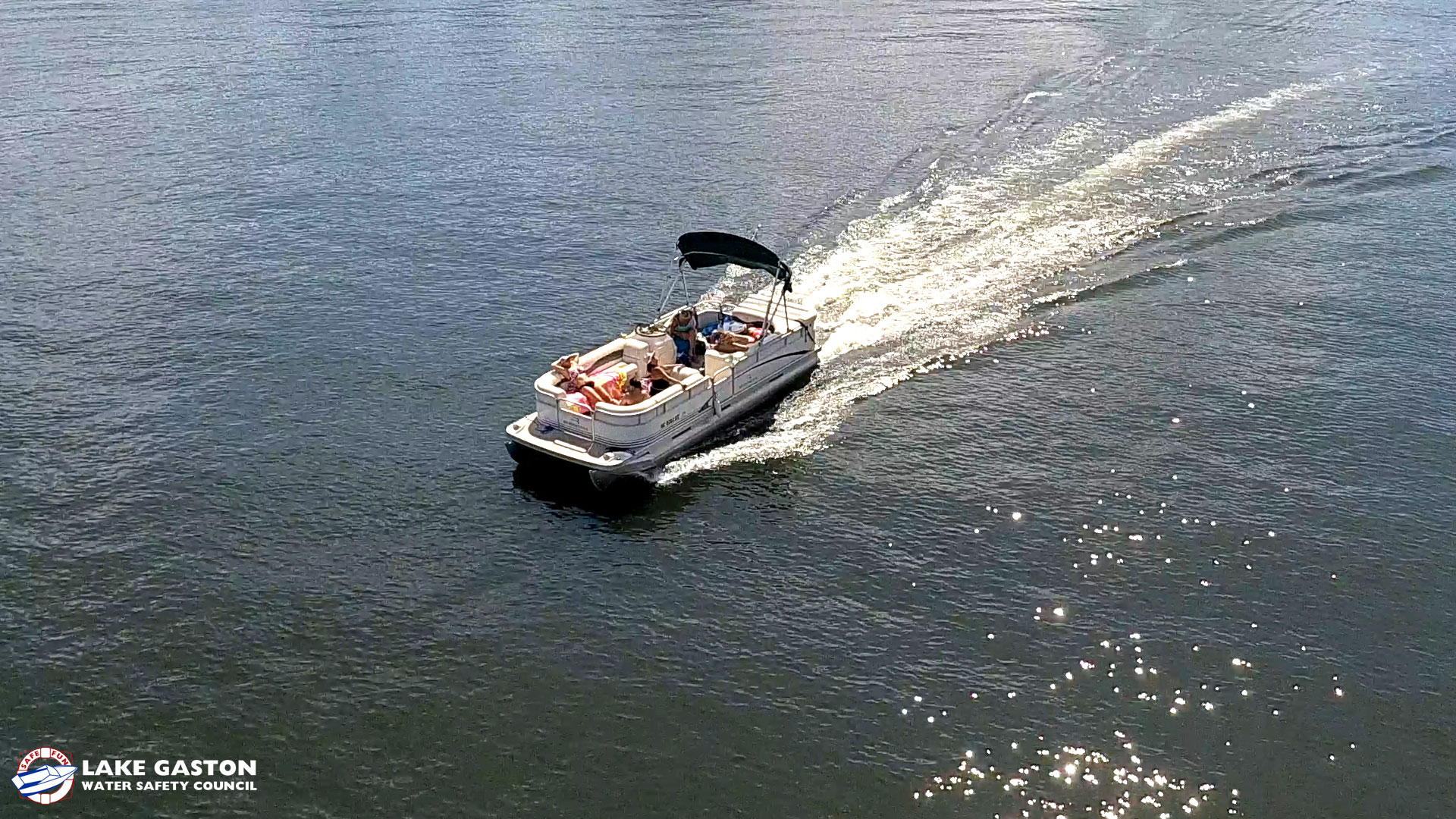ALL VESSELS MUST CARRY A READILY ACCESSIBLE (AT HAND, UNWRAPPED) U.S. COAST GUARD APPROVED AND SERVICEABLE LIFE JACKET OF THE PROPER SIZE FOR EVERY PERSON ON BOARD.
FEDERAL REGULATIONS REQUIRE CHILDREN UNDER THE AGE OF 13 WEAR A U.S. COAST GUARD APPROVED LIFE JACKET ALL THE TIME WHEN UNDERWAY (not anchored or docked) ON ANY SIZE VESSEL.
A Children's Life Jacket Loaner Program, sponsored by the Lake Gaston Water Safety Council, is in place at the following locations to promote life jacket safety: Bracey at Americamps, Holly Grove Marina and Lake Gaston Water Sports at Poplar Creek; Gasburg at The Club; Henrico at Washburn's Marina and Sherwood Forest; and Littleton at Morningstar Marina at Eaton Ferry, Outdoor World and Stonehouse Timber Lodge. CLICK HERE for more details about the Children's Life Jacket Loaner Program.
IN BOTH NORTH CAROLINA AND VIRGINIA A CHILD MUST BE AT LEAST 14 TO OPERATE A PERSONAL WATERCRAFT (PWC). CHILDREN 14 AND 15 YEARS OLD MAY OPERATE A PWC IF THEY CARRY PROOF OF AGE AND THE CERTIFICATE OF COMPLETION OF A RECOGNIZED SAFE BOATING COURSE. ALL PERSONS ON A PWC MUST WEAR A U.S. COAST GUARD APPROVED LIFE JACKET. THE LIFE JACKET MUST HAVE ALL FASTENERS FASTENED.
All powered vessels operating before sunrise and after sunset must display proper lighting which includes the red and green navigation lights and all-around white stern light. All other vessels (canoes, kayaks, rowboats, and sailboats) must have at least a visible white light.
Personal Watercraft (PWC) are not to be operated before sunrise or after sundown.
Water-skiing, knee-boarding, towed floats, and wakeboards are allowable between one-half hour before sunrise to one-half hour after sunset in Virginia and one hour before sunrise and one hour after sunset in North Carolina. Special care should be given to ensure that towed persons can be clearly seen when in the water.
Every vessel is required to have an audible device for sounding an alarm or signal such as a whistle, horn or bell. Every vessel should have a device for visually signaling for aid such as an orange flag, orange Life Preserver, mirror/reflector or flare.
Every boater should be alert for and offer assistance to any boater or swimmer in distress.
Every powered vessel must be equipped with a properly charged, U.S. Coast Guard approved Type B-I or B-II fire extinguisher. Vessels 26-40 feet must have two Type B-I or one Type B-II.
Most vessels carry a rating plate that identifies the number of persons that can be safely aboard. The number of persons on board and the number of persons being towed (on floats, skis or any other towable) cannot exceed the number of people for which the vessel is rated.
The above requirements apply to Personal Watercraft (PWC) as well. If the PWC is rated for three, then two can be on the PWC with one being towed. If the PWC is rated for two then only one person can be on the PWC with one being towed.
In NC if there is no rearview mirror, then an observer is required on PWCs and recommended for other vessels. In Virginia, there is no language regarding rearview mirrors in the law. The Virginia law requires those being towed to wear a Life jacket unless there is an observer.
U.S. Coast guard, Virginia conservation Police and NC Wildlife Officers are authorized to cite operators for reckless operation for speed causing unsafe conditions or operation causing peril to others.
When a vessel is underway no person should sit, stand, or lay outside the enclosed seating area, i.e. above the motor or outside the gated area on pontoon and deck boats.
It is illegal to use docking lights when underway.
It is illegal for boaters, PWC operators and skiers to jump vessel wakes. It is unsafe to tow skiers or persons on floats under bridges.
Maintain "NO WAKE" idle speeds at all bridges (strictly enforced), in proximity to stopped enforcement officers (strictly enforced) and when within proximity to swimmers, skiers down, anchored vessels, docks, and marina areas. PWCs are not to e operated within 50 feet in Virginia and 100 feet in North Carolina of docks, shorelines, other vessels or swimmers. The vessel operator is liable for any damage caused by his vessel to other persons or property. Do not operate in excess of safe speed when entering channels, coves or congested areas.
Be alert for buoys and become familiar with their messages. It is unlawful to tie up or moor to buoys. It is unlawful to move buoys.
It is unlawful to tie up to or moor to bridges.
Sailboats not under power and boats propelled by oars or paddles have the right of way.
Any accident involving physical injury, death, or damage exceeding the value of $2000 in NC or in VA, must be reported to the property state agency (NC Wildlife Resources or VA Dept. of Game and Inland Fisheries).
Public Education
America's Boating Course is an eight-hour course covering the basics of boating and is appropriate for youth as well as the adult boater. Successful completion of this course satisfies the education requirement for youth to operate a PWC in both Virginia and North Carolina. Remember: Virginia now has a law that all boaters in the waters of Virginia will have to show proof of taking a Boating Course. North Carolina Law effective 1 Jan of 2014 requires that all PWC and Motor Boat Operators born after 1 Jan 1988 will have proof of taking a Boating Course, if they are operating a vessel with with an 10 HP engine or greater. The fee for the course is $30. Pre-registration and prepayment are required.


